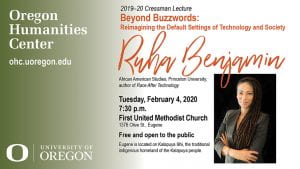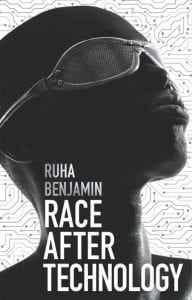
Algorithms that shape our lives encode inequities

From everyday apps to complex algorithms, technology has the potential to hide, speed, and even deepen discrimination, while appearing neutral and even benevolent when compared to racist practices of a previous era. Ruha Benjamin, author of Race After Technology, explores the world of biased bots, altruistic algorithms, and their many entanglements, and provides conceptual tools to decode tech promises with sociologically informed skepticism.
Join us for the first lecture in our series “Convergence: intersections between the sciences and the humanities.” Ruha Benjamin will give the Oregon Humanities Center’s 2019–20 Cressman Lecture in the Humanities, “Beyond Buzzwords: Reimagining the Default Settings of Technology and Society,” on Tuesday, February 4, 2020 at 7:30 p.m. at the First United Methodist Church, 1376 Olive St. in Eugene. She will present the concept of the “New Jim Code” to explore a range of discriminatory designs that encode inequity: by explicitly amplifying racial hierarchies, by ignoring but thereby replicating social divisions, or by aiming to fix racial bias but ultimately doing quite the opposite. Benjamin will also consider how race itself is a kind of tool designed to stratify and sanctify social injustice and discuss how technology is and can be used toward liberatory ends. Benjamin will challenge us to question not only the technologies we are sold, but also the ones we manufacture ourselves.
Benjamin is an Associate Professor in the Department of African American Studies at Princeton University, where she studies the social dimensions of science, technology, and medicine; race and citizenship; knowledge and power. She is also the founder of the JUST DATA Lab, and a Faculty Associate in the Center for Information Technology Policy, Program on History of Science, Center for Health and Wellbeing, Program on Gender and Sexuality Studies, and Department of Sociology. Benjamin serves on the Executive Committees for the Program in Global Health and Health Policy and Center for Digital Humanities.
Benjamin’s first book, People’s Science: Bodies and Rights on the Stem Cell Frontier (2013), investigates the social dimensions of stem cell science with a particular focus on the passage and implementation of a “right to research” codified in California. Her second book, Race After  Technology: Abolitionist Tools for the New Jim Code (2019) examines the relationship between machine bias and systemic racism, analyzing specific cases of “discriminatory design” and offering tools for a socially-conscious approach to tech development. Her edited volume, Captivating Technology: Race, Carceral Technoscience, and Liberatory Imagination in Everyday Life (2019), brings together a set of scholars who explore the interplay between innovation and containment across a wide array of social arenas, past and present.
Technology: Abolitionist Tools for the New Jim Code (2019) examines the relationship between machine bias and systemic racism, analyzing specific cases of “discriminatory design” and offering tools for a socially-conscious approach to tech development. Her edited volume, Captivating Technology: Race, Carceral Technoscience, and Liberatory Imagination in Everyday Life (2019), brings together a set of scholars who explore the interplay between innovation and containment across a wide array of social arenas, past and present.
Benjamin’s talk is free and open to the public. First United Methodist Church has free parking. For more information contact ohc@uoregon.edu or call (541) 346-3934.